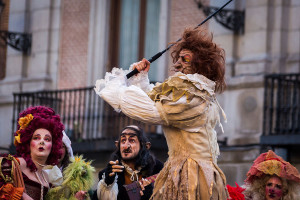Puppets Fight for Free Speech in Spain
Two puppeteers accused of glorifying terrorism and promoting hatred in a puppet performance during Spain’s Carnival festivities were released from Madrid’s Soto del Real prison earlier last month. Charges against Alfonso Lázaro, age 29, and Raúl García, age 34, were filed on February 5 after one of their puppets held up a sign reading: “Gora Alka-ETA,” a play on words in the Basque language which means “Long live al-Qaeda-ETA.” ETA refers to the Basque separatist group, Euskadi Ta Askatasuna (Basque Country and Freedom). Although the puppeteers have been released, they are required to report regularly to local authorities and have had their passports confiscated.

Multiple protesters have defied Spanish Prime Minister Mariano Rajoy’s “gag” law limiting public demonstration and have instead taken to the streets of several cities, including Madrid. On February 12, the head of Amnesty International’s Spanish branch, Esteban Beltrán, called for the charges to be dropped, stating, “A piece of theatre, however inappropriate its content may appear, is not a security risk.”
However, not everyone views the performance as an arbitrary violation of freedom of expression. In the official court rulings, the investigating judge, Ismael Moreno, states that “Freedom of expression cannot be cover for hateful speech.”
The recent arrests of Lázaro and García add to a series of terrorism-related convictions against multiple Spanish artists, including a rap musician and a poet. Critics suggest that a fear of terrorism within the European Union has seriously compromised freedom of speech and protest in Europe.
